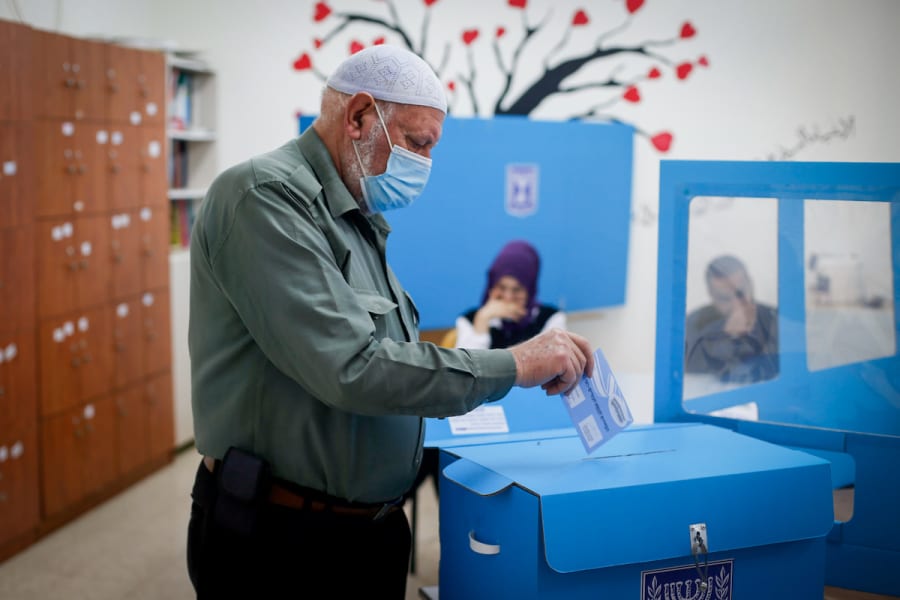‘Future of Jewish nation-state will be determined by the Arabs,’ expert says
At least half of Israelis plan to vote for the same party in this election as they did in March 2021, survey shows; However, low Arab voter turnout could enable the Right to form a coalition, experts say

Two months before Israelis go to the ballot box for the fifth time in three and a half years, one expert said that the Right’s ability to form a strong, majority coalition depends mostly on voter turnout among Israel’s Arab minority.
“The future of the nation-state of the Jewish people will be determined by the Arabs whether we like it or not,” explained Prof. Tamar Hermann, academic director of the Viterbi Family Center for Public Opinion and Policy Research at the Israel Democracy Institute (IDI).
Last month, a poll conducted by Stat-Net predicted that the participation rate in Arab society could be as low as 39% in the next election – the lowest figure recorded to date. By contrast, 45% of Arabs voted in the March 2021 elections; 65% in 2020, 59% in the September 2019 election and 49% in the April 2019 election.
A turnout of under 40% would be the lowest in more than 20 years.
Hermann’s own poll, the Israeli Voice Index, released last week, showed that 26% of Arab respondents who voted in the last election said this time they do not intend to vote.
The result, Hermann said, would be a “disproportionate strengthening of the Right.”
She predicted that such low Arab voter turnout would ensure that the Center-Right bloc led by former Prime Minister Benjamin Netanyahu would achieve the 61 seats needed for a governing majority in Israel’s parliament.
In fact, Netanyahu now believes he has at least 62 seats, Ha’aretz columnist Yossi Verter reported over the weekend. Netanyahu’s optimism also appears to be based on expected voter turnout in the Arab community coming in at historically low proportions, Verter wrote. With less than 40% of Arabs voting, the right-wing bloc stands to gain another seat to a seat and a half, statistically speaking.
However, Prof. Jonathan Rynhold, head of the Political Studies Department at Bar Ilan University, cautioned that “things can change very quickly.
“Arab voting went up and down in the last two elections by around 15%. The margins are too narrow and the amount of developments that could affect them in the short term are too many,” he said.
50% OF ISRAELIS WILL VOTE FOR THE SAME PARTY AS THEY DID IN THE PREVIOUS ELECTION
Rynhold said that Israelis have three calculations when they turn out to vote: 1) which party they ideally want to support; 2) whether that party can cross the electoral threshold; 3) and – given that no one party in Israel will have the majority – which other parties their party could align with their preferred coalition.
The IDI poll, based on data captured from Aug. 21 to 24, showed that at least half of the public intends to vote for the same party they voted for in the previous election, especially those who voted for the larger parties currently in the opposition, such as Likud. Specifically, the survey found that 78% of voters from opposition parties intend to vote for the same party again.
In addition, only 6% of Israelis responded that they intend to switch blocs.
This was despite the survey being taken at the tail end of a month that saw five party primaries; the entry into politics of popular former IDF Chief of Staff Gadi Eisenkot; the formation of the Zionist Spirit party, based on Yamina; the split then merger of the Religious Zionist party; and more.
Rynhold explained that the stagnation in voting patterns is partly a result of people being motivated by “what could be worse” rather than looking to change the country’s present predicament.
“They don’t just think it could be better, but that it could be worse, so perhaps it is best to stay where they are,” he said.
Moreover, the IDI survey revealed that the majority (61%) of Jews in Israel tend to vote for the same party or the same bloc as their family or friends. Some 38% intend to vote for the same party, and a further 23% will vote for a different party within the same political camp in this upcoming election, according to the survey.
“Choosing your political bloc in Israel is something deeply entrenched in your identity, and people do not change their identity,” Hermann explained. “The room for maneuvering is very limited… We are in a stalemate. But this is not an electoral stalemate. It is a cognitive, psychological and identity-related stalemate.”
She noted that although parties’ economic agendas were ranked as the most crucial factor to voters this year, the identity of the party leader ranked second, except for Likud voters, for whom the identity of the party’s leader was cited as the most important factor in voting for it.
ISRAELIS STILL BELIEVE THEIR VOTES COUNT
The good news, Hermann added, is that despite repeated elections with similar results, Israelis still believe that their vote counts.
The IDI survey found that two-thirds of the public disagree with the statement: “It doesn’t matter who you vote for; it doesn’t change the situation.”
In fact, Hermann said, the level of disagreement with this statement was the highest her team has found since 2015.
.jpg)
Maayan Hoffman is a veteran American-Israeli journalist and strategic communications consultant. She is Deputy CEO - Strategy & Innovation for the Jerusalem Post, where she also served as news editor, head of strategy and senior health analyst.














